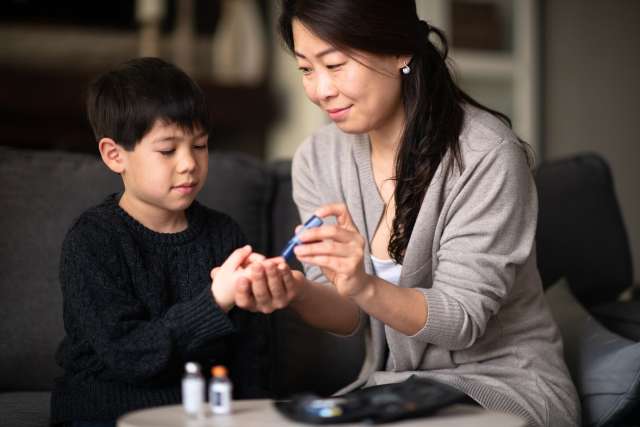Diabetes is hard for adults to live with, let alone kids. And unfortunately, type 1 diabetes, seen mostly in children, is on the rise. This means that growing numbers of young people must manage their blood sugar, all day, every day.
But there’s good news, too. UCLA Health and UCLA Mattel Children's Hospital now treat kids who are at risk of getting type 1 diabetes with a new drug called teplizumab. The FDA-approved medicine can help kids ages 8 and older put off symptoms for up to two years.
The new treatment is possible because of decades of study. This includes work done by researchers through an international network called TrialNet that involves UCLA researchers and many others.
How the medicine works
Type 1 diabetes is an autoimmune disease in which the body attacks the cells of the pancreas that make insulin. In the past, there was no treatment until there were symptoms such as being thirsty, peeing more, and weight loss. Children would then need to go on insulin immediately.
Today, doctors can help before a child has symptoms and delay the need for insulin. A screening blood test can see if a child is at higher risk for the disease. If they are, they can receive the drug.
Make an appointment(Link is external)
“The medicine helps combat the immune cells that are attacking the pancreas beta cells that make insulin,” says Christina Reh, MD, associate professor at UCLA, clinical director of the pediatric diabetes program for UCLA Westwood and surrounding clinics.
UCLA Health created a clinical program to give the drug to patients in need over the course of 14 days. Patients receive it in person for the first five days. They then get the rest of the medicine at home.
The future of screening and treatment
Doctors are debating about which kids should be screened now that this treatment exists.
“Ninety percent of the people who develop type 1 diabetes don’t have a family history of the disease, so those are the people we’re trying to find,” says Dr. Reh.
Dr. Reh says screening is especially important if young people have a family history of the condition or if they have another autoimmune disease since it is 15 times more likely for these children to get diabetes.
“If we can catch people sooner, that’s when this medication works best,” she says. “This is not a cure, but it’s a step toward one.”




